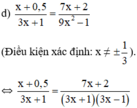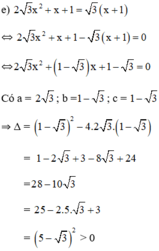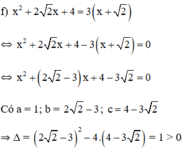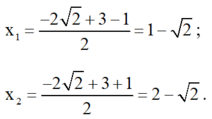Giải pt
2x3-5x2+3x =0
(x-3)2 =(2x+1)2
(3x-1)(x2+2)=(3x-1)(7x-10)
Hãy nhập câu hỏi của bạn vào đây, nếu là tài khoản VIP, bạn sẽ được ưu tiên trả lời.


a)
5 x 2 − 3 x + 1 = 2 x + 11 ⇔ 5 x 2 − 3 x + 1 − 2 x − 11 = 0 ⇔ 5 x 2 − 5 x − 10 = 0
Có a = 5; b = -5; c = -10 ⇒ a - b + c = 0
⇒ Phương trình có hai nghiệm: x 1 = - 1 v à x 2 = - c / a = 2 .
Vậy phương trình có tập nghiệm S = {-1; 2}.

⇔ 6 x 2 − 20 x = 5 ( x + 5 ) ⇔ 6 x 2 − 20 x − 5 x − 25 = 0 ⇔ 6 x 2 − 25 x − 25 = 0
Có a = 6; b = -25; c = -25
⇒ Δ = ( - 25 ) 2 – 4 . 6 . ( - 25 ) = 1225 > 0
⇒ Phương trình có hai nghiệm

Vậy phương trình có tập nghiệm 

⇔ x 2 = 10 − 2 x ⇔ x 2 + 2 x − 10 = 0
Có a = 1; b = 2; c = -10 ⇒ Δ ’ = 1 2 – 1 . ( - 10 ) = 11 > 0
⇒ Phương trình có hai nghiệm

Cả hai nghiệm đều thỏa mãn điều kiện xác định.
Vậy phương trình có tập nghiệm 

⇔ ( x + 0 , 5 ) ⋅ ( 3 x − 1 ) = 7 x + 2 ⇔ 3 x 2 + 1 , 5 x − x − 0 , 5 = 7 x + 2 ⇔ 3 x 2 − 6 , 5 x − 2 , 5 = 0

Vậy phương trình có tập nghiệm 

⇒ Phương trình có hai nghiệm

Vậy phương trình có tập nghiệm 

Phương trình có hai nghiệm:

Vậy phương trình có tập nghiệm ![]()

1) (2x + 1)(3x – 2) = (5x – 8)(2x + 1)
⇔ (2x + 1)(3x – 2) – (5x – 8)(2x + 1) = 0
⇔ (2x + 1).[(3x – 2) – (5x – 8)] = 0
⇔ (2x + 1).(3x – 2 – 5x + 8) = 0
⇔ (2x + 1)(6 – 2x) = 0
⇔\(\left[{}\begin{matrix}2x+1=0\\6-2x=0\end{matrix}\right.\) ⇔ \(\left[{}\begin{matrix}x=\dfrac{-1}{2}\\x=3\end{matrix}\right.\)
Vậy.....
2) 4x2 -1 = (2x + 1)(3x - 5)
⇔ (2x-1)(2x+1)-(2x+1)(3x-5)=0
⇔ (2x+1)(2x-1-3x+5)=0
⇔ (2x+1)(4-x)=0
⇔ \(\left[{}\begin{matrix}2x+1=0\\4-x=0\end{matrix}\right.\) ⇔ \(\left[{}\begin{matrix}x=\dfrac{-1}{2}\\x=4\end{matrix}\right.\)
Vậy...
3)
(x + 1)2 = 4(x2 – 2x + 1)
⇔ (x + 1)2 - 4(x2 – 2x + 1) = 0
⇔ x2 + 2x +1- 4x2 + 8x – 4 = 0
⇔ - 3x2 + 10x – 3 = 0
⇔ (- 3x2 + 9x) + (x – 3) = 0
⇔ -3x (x – 3)+ ( x- 3) = 0
⇔ ( x- 3) ( - 3x + 1) = 0
⇔\(\left[{}\begin{matrix}x-3=0\\-3x+1=0\end{matrix}\right.\) ⇔\(\left[{}\begin{matrix}x=3\\x=\dfrac{1}{3}\end{matrix}\right.\)
Vậy......

Bài 1)1)\(x^2+5x+6=x^2+3x+2x+6\)=0
=x(x+3)+2(x+3)=(x+2)(x+3)=0
Dễ rồi
2)\(x^2-x-6=0=x^2-3x+2x-6=0\)
=x(x-3)+2(x-3)=0
=(x+2)(x-3)=0
Dễ rồi
3)Phương trình tương đương:\(\left(x^2+1\right)\left(x+2\right)^2=0\)
Vì \(x^2+1>0\)
=>\(\left(x+2\right)^2=0\)
Dễ rồi
4)Phương trình tương đương\(x^2\left(x+1\right)+\left(x+1\right)\)=0
=> \(\left(x^2+1\right)\left(x+1\right)=0Vì\) \(x^2+1>0\)
=>x+1=0
=>..................
5)\(x^2-7x+6=x^2-6x-x+6\) =0
=x(x-6)-(x-6)=0
=(x-1)(x-6)=0
=>.....
6)\(2x^2-3x-5=2x^2+2x-5x-5\)=0
=2x(x+1)-5(x+1)=0
=(2x-5)(x+1)=0
7)\(x^2-3x+4x-12\)=x(x-3)+4(x-3)=(x+4)(x-3)=0
Dễ rồi
Nghỉ đã hôm sau làm mệt

\(1,=3x^2-6x+x-2=3x^2-5x-2\\ 2,??\\ 3,=3x^3y^2:3xy+6x^2y^3:3xy-12xy^4:3xy=x^2y+2xy^2-4y^3\\ 4,=3x^3y^2:4xy+6x^2y^3:4xy-12xy^4:4xy\\ =\dfrac{3}{4}x^2y+\dfrac{3}{2}xy^2-3x^3\\ 5,\left(2x^3-5x^2+7x-6\right):\left(2x-3\right)=x^2-x+2\\ 6,\left(x^4-x^3+3x^2+x+2\right):\left(x^2-1\right)=x^2-x+4\left(dư6\right)\)
1: =3x^2+x-6x-2=3x^2-5x-2
3: =x^2y+2xy^2-4y^3
4: =3/4x^2y+3/2xy^2-3y^3
5: \(=\dfrac{2x^3-3x^2-2x^2+3x+4x-6}{2x-3}=x^2-x+2\)

\(\left(1-x\right)\left(5x+3\right)=\left(3x-7\right)\left(x-1\right)\)
\(< =>\left(1-x\right)\left(5x+3+3x-7\right)=0\)
\(< =>\left(1-x\right)\left(8x-4\right)=0\)
\(< =>\orbr{\begin{cases}1-x=0\\8x-4=0\end{cases}< =>\orbr{\begin{cases}x=1\\x=\frac{1}{2}\end{cases}}}\)
\(\left(x-2\right)\left(x+1\right)=x^2-4\)
\(< =>\left(x-2\right)\left(x+1\right)=\left(x-2\right)\left(x+2\right)\)
\(< =>\left(x-2\right)\left(x+1-x-2\right)=0\)
\(< =>-1\left(x-2\right)=0\)
\(< =>2-x=0< =>x=2\)

Bài 1:
a) (3x - 2)(4x + 5) = 0
<=> 3x - 2 = 0 hoặc 4x + 5 = 0
<=> 3x = 2 hoặc 4x = -5
<=> x = 2/3 hoặc x = -5/4
b) (2,3x - 6,9)(0,1x + 2) = 0
<=> 2,3x - 6,9 = 0 hoặc 0,1x + 2 = 0
<=> 2,3x = 6,9 hoặc 0,1x = -2
<=> x = 3 hoặc x = -20
c) (4x + 2)(x^2 + 1) = 0
<=> 4x + 2 = 0 hoặc x^2 + 1 # 0
<=> 4x = -2
<=> x = -2/4 = -1/2
d) (2x + 7)(x - 5)(5x + 1) = 0
<=> 2x + 7 = 0 hoặc x - 5 = 0 hoặc 5x + 1 = 0
<=> 2x = -7 hoặc x = 5 hoặc 5x = -1
<=> x = -7/2 hoặc x = 5 hoặc x = -1/5

1: Sửa đề: 3x-5
\(=\dfrac{-x^2\left(3x-5\right)-3\left(3x-5\right)}{3x-5}=-x^2-3\)
2: \(=\dfrac{5x^4-5x^3+14x^3-14x^2+12x^2-12x+8x-8}{x-1}\)
=5x^2+14x^2+12x+8
3: \(=\dfrac{5x^3+10x^2+4x^2+8x+4x+8}{x+2}=5x^2+4x+4\)
4: \(=\dfrac{\left(x^2-1\right)\left(x^2+1\right)-2x\left(x^2-1\right)}{x^2-1}=x^2+1-2x\)
5: \(=\dfrac{x^2\left(5-3x\right)+3\left(5-3x\right)}{5-3x}=x^2+3\)
a) \(2x^3-5x^2+3x=0\)
\(\Leftrightarrow x\left(2x^2-5x+3\right)=0\)
\(\Leftrightarrow x\left(2x^2-2x-3x+3\right)=0\)
\(\Leftrightarrow x\left[2x\left(x-1\right)-3\left(x-1\right)\right]=0\)
\(\Leftrightarrow x\left(x-1\right)\left(2x-3\right)=0\)
\(\Leftrightarrow\left[{}\begin{matrix}x=0\\x-1=0\\2x-3=0\end{matrix}\right.\Leftrightarrow\left[{}\begin{matrix}x=0\\x=1\\x=\dfrac{3}{2}\end{matrix}\right.\)
Vậy .................
b) \(\left(x-3\right)^2=\left(2x+1\right)^2\)
\(\Leftrightarrow\left(2x+1\right)^2-\left(x-3\right)^2=0\)
\(\Leftrightarrow\left(2x+1-x+3\right)\left(2x+1+x-3\right)=0\)
\(\Leftrightarrow\left(x+4\right)\left(3x-2\right)=0\)
\(\Leftrightarrow\left[{}\begin{matrix}x+4=0\\3x-2=0\end{matrix}\right.\Leftrightarrow\left[{}\begin{matrix}x=-4\\x=\dfrac{2}{3}\end{matrix}\right.\)
Vậy ...............
c) \(\left(3x-1\right)\left(x^2+2\right)=\left(3x-1\right)\left(7x-10\right)\)
\(\Leftrightarrow\left(3x-1\right)\left(x^2+2\right)-\left(3x-1\right)\left(7x-10\right)=0\)
\(\Leftrightarrow\left(3x-1\right)\left(x^2+2-7x+10\right)=0\)
\(\Leftrightarrow\left(3x-1\right)\left(x^2-7x+12\right)=0\)
\(\Leftrightarrow\left(3x-1\right)\left(x-3\right)\left(x-4\right)=0\)
P/s: tới đây bn tự giải tiếp nha